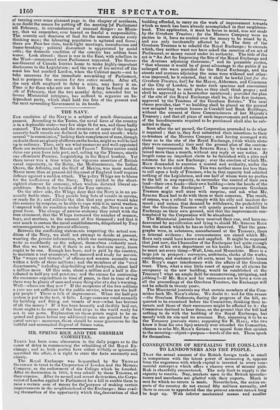THE NAVY.
Tux condition of the Navy is a subject of much discussion at present. According to the Tories, the naval force of the country is in a deplorable state—very few ships fit for sea, and those badly manned. The materials and the structure of some of the largest recently-built vessels are declared to be rotten and unsafe ; while several "in commission," lacking their complement of men, though no doubt there are plenty °falters on the books, might as well be laid up in ordinary. Then, only see what numercus and well-appointed fleets are maintained by Russia and France ! Either nation could drive our puny force into port, and, sailing up the Thames. startle our effeminate Premier, languishing in the Royal boudoir. Yet there never was a time when the vigorous assertion of British naval superiority, in the Baltic, the Mediterranean, the Indian Ocean, the Atlantic, and the Gulf of Mexico, was more needed. Never more than at present did the coast of England itself require defence against a sudden attack. The paltry W higs are to blame for the inefficiency of the Navy. They yielded to the shortsighted clamour for economy, when wisdom dictated liberal expenditure. Such is the burden of the Tory outcries. On the other side, the Whigs deny that the Navy is in an unuaually feeble state. They parade long lists of vessels in service, or ready for it ; and ridicule the idea that any power would take this country by surprise, or be able to cope with it in naval warfare. Compared with its condition under Tory rule, the Navy is now in great force. The charge of unwise economy they retort with the true statement, that the Whigs increased the number of seamen, boys, and marines, to the amount of five thousand ; and that it cost much to restore the naval establishments, dilapidated by Tory mismanagement, to its present efficiency.
Between the conflicting statements respecting the actual condition of the Navy, we shall not attempt to decide at present, wanting the precise information, which our contemporaries, who write so confidently on the subject, themselves evidently need. But this we know, that if there is not a first-rate navy, there ought to be one. Enough has been, and is paid by the country, to maintain a vast armament, well manned and ready for service. The "wages and victuals" of officers and seamen annually cost within a trifle of three millions ; and the members of the "civil departments," including ship-building and dockyards, about half a million more. Of this sum, about a million and a half is distributed in half-pay and pensions ; and the excuse for continuing the enormous expenditure in time of peace, is that in time of war there may be plenty of men and every thing else at a day's warning. Well—where are they now ? If the recipients of the two millions a sear are not sufficient for the public service, where are the halfpay people ? There is talk of impressment. When the half-pay system is put to the test, it fails. Large sums are voted annually for building and fitting out vessels of war—what has become of all the money ? If it has been honestly and thriftily laid out, there ought to be scores of the best ships in the world ready for sea in our ports. Explanation on these points ought to be required and given before any additional sums are granted for the naval service : moreover, there should be some guarantee for the faithful and economical disposal of future votes.


























 Previous page
Previous page